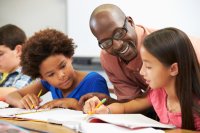Junior Historians at Work
A fourth-grade teacher shares a project-based learning unit that incorporates social studies, literacy, math, and 21st-century skills.
Your content has been saved!
Go to My Saved Content.As a fourth-grade teacher, I can truly appreciate how a well-constructed project-based learning experience offers opportunities for stronger, more consistent reinforcement and support of important foundational learning skills and concepts across multiple disciplines and provides me more time for individualized and differentiated instruction for my learners.
Most importantly, PBL allows for additional opportunities to assess my learners for understanding and mastery—once a project is underway, I find myself constantly formatively assessing for a long list of literacy, math, social studies, and 21st-century skills benchmarks.
When planning a PBL experience, I try to front-load my design as much as possible. This always begins with a driving question that challenges the children to identify how they can use their learning and skills to help others within their communities. Next, I embed applicable skills and concepts across multiple disciplines that the project will require the learners to understand and apply. The children immediately know the skills they are going to need in order to answer the question, and the result is contextualized learning with relevancy.
Caretakers of History
Recently my fourth graders completed a PBL experience called Caretakers of History, during which they worked on the driving question, “How can we, as junior historians, raise public awareness and appreciation for Smith’s Castle?” The castle is a historic landmark and museum in Rhode Island that dates back to the early colonial period.
After developing deliverables, I guided the children on a discussion of “need-to-knows” in the areas of content and skills. Based on the deliverable ideas that they brainstormed, they identified relatively quickly that they would need to:
- know how to make and read a timeline
- identify and use primary and secondary sources
- understand the American colonial period
- research specific people, places, and time periods
- produce an innovative solution and present it to authentic audiences
- know how to organize and write informative paragraphs
- initiate and participate in a range of collaborative discussions with diverse partners
All of these skills and concepts are contained in our state standards for mathematics, language arts, social studies, and 21st-century skills, and were embedded in the original project summary.
Each child selected an individual project component as well as a small group component, and then set to work individually and in their groups to develop their ideas.
With PBL, assessing student progress and understanding actually becomes the easiest part of my work. Since I’m no longer spending the majority of my class time standing and delivering, I can use project work periods to formatively assess my learners’ understanding in real time. I’m able to quickly adjust instruction for small groups and individuals who need either support or enrichment, while still maintaining high expectations. PBL also provides me with opportunities to circle back to specific children and revisit important skills and concepts from different disciplines on a daily basis.
Students use project reflection journals and multiple rubrics to self-assess after each PBL work session, answering questions provided by me that are designed to elicit reflection on their performance as individuals and/or team members. For example, “What positive contributions did you make to your teamwork today?”
I may also use questions about content and skills. For example, “How did you use what you learned about paragraphs to help you with your webpage today?”
The children are so accustomed to reflecting that all I have to ask is, “What time is it?” and they respond in unison, “Reflection time!” These journals are submitted to me each day and I am able to assess, on a daily basis, the children’s learning and understanding.
The most exciting thing about PBL for me as a teacher is when learners come to me and say, “Mr. L., we need to learn this!” For the first time in my teaching career, my learners are demanding that I teach them the skills they need to do successful and real work.
How Students Shared Their Learning
Final products and presentations serve as forms of summative assessment; with the constant teacher assessment, self-assessment, and reflecting happening daily within the project work, these final products are almost always impressive and exceed expectations.
In the case of our Caretakers of History project, the children published an op-ed in the local newspaper, created a comprehensive website using their own research and writing as content, developed interactive exhibits, presented to high school students and important members of their community, and developed an online virtual timeline of both the museum and their own project process.
I couldn’t be prouder or feel more satisfied as an educator. I trusted my learners to own their learning and recognize its relevance, and the number of skills and concepts they acquired during this three-month project went well beyond what would normally be covered in a more traditional classroom model. And my ability to be a responsive and guiding facilitator of that learning process was extremely rewarding.
As one of my children shared during her reflection on the work, “We did a ton of work, we learned a lot, and we made a difference. Not many kids can say that.” Hopefully more kids will be able to say that in the years ahead.
